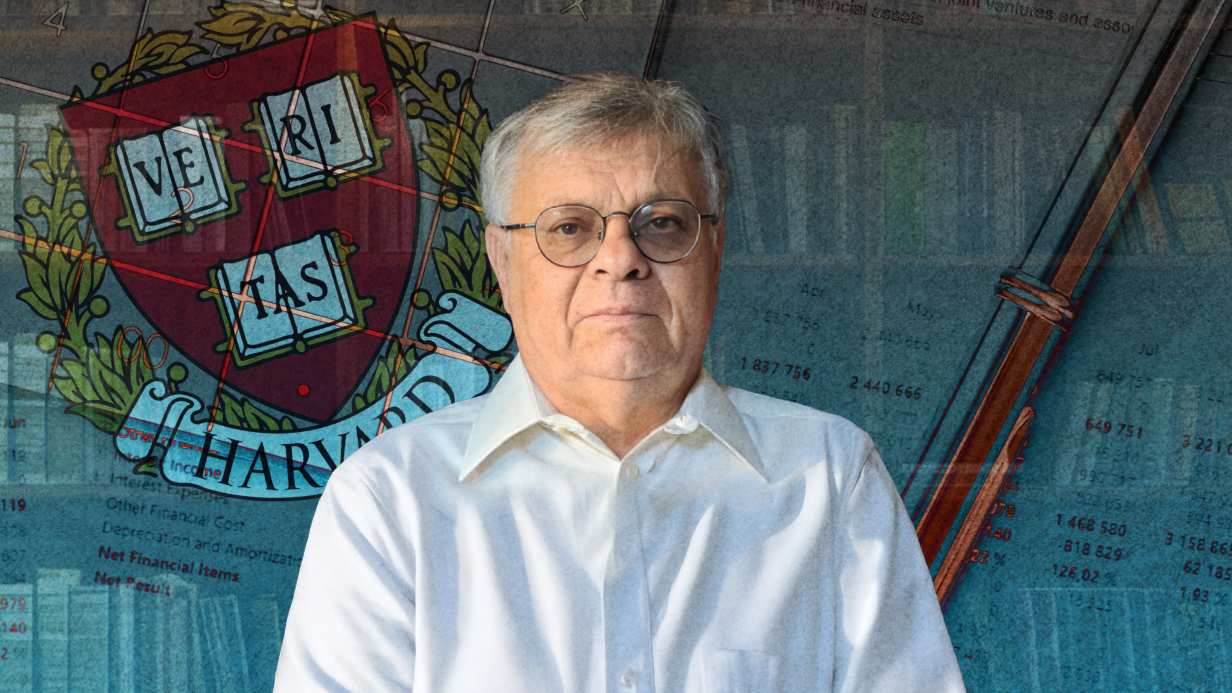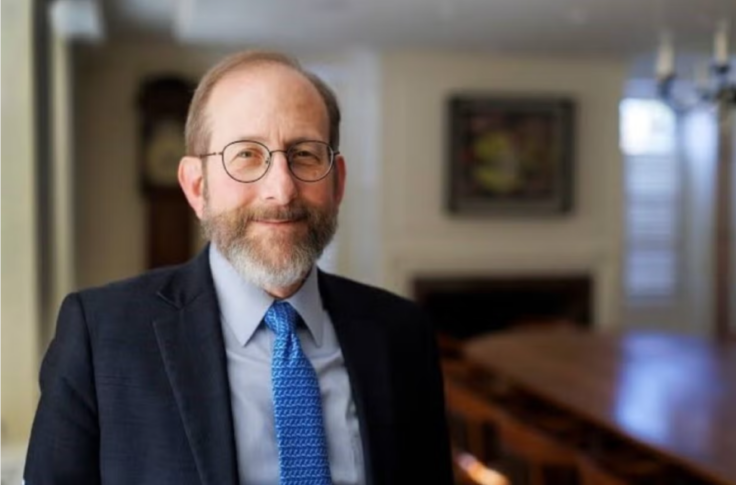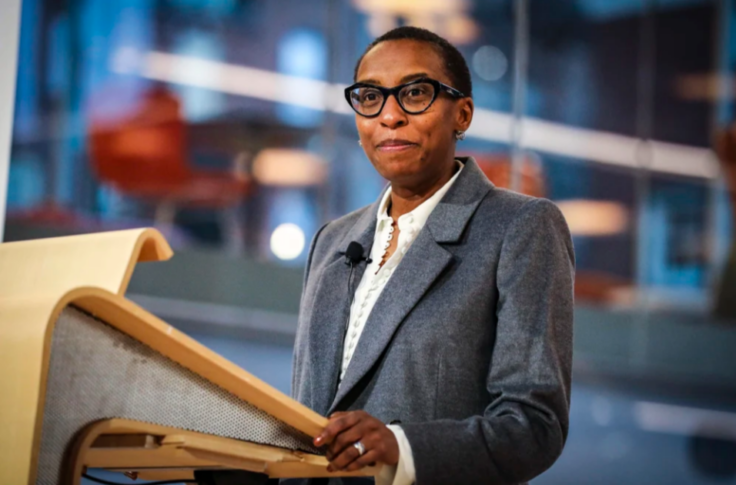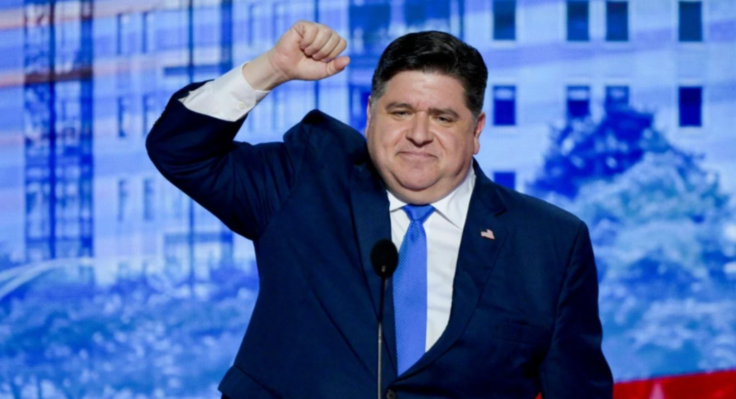
Harvard University refused to obey the Trump administration and sued the officials. Why is the whole world watching this conflict? What is being demanded of the university? What is Harvard defending? What role did DEI policy and anti-Semitism play in the attack on academic freedom? T-invariant talked to Eugene Shakhnovich, a professor in the Department of Chemistry and Chemical Biology at Harvard University.
Evgeny Shakhnovich
Born in 1957. Graduated from the Physics Department of Moscow State University. From 1981 to 1990 he worked at the Protein Institute of the USSR Academy of Sciences, first as a graduate student and then as a research associate in the Protein Physics Laboratory under the supervision of O.B. Ptitsin. Ptitsin. In 1990 he came to the USA. In 1990-1991, he was a postdoc with Martin Karplus (Nobel Prize 2013). From 1991-1996 he was Associate Professor, Associate Professor, and since January 1, 1997, Full Professor (with tenure) in the Department of Chemistry and Chemical Biology at Harvard University. Since 2019, he has been the Roy G Gordon Professor of Chemistry and Chemical Biology (endowed chair). He is head of the Laboratory of Molecular and Evolutionary Biophysics. Author of about 500 papers covering such areas as protein folding, evolutionary biophysics, drug design by computer modeling, use of biophysics and artificial intelligence to predict pandemics, and more. He is the founder of a number of biotechnology companies.
Administrative freakout
T-invariant: The situation at Harvard has the world’s attention. On April 11, Harvard President Alan Garber received a letter from the president’s administration with a list of demands – and refused to meet them. On April 16, $2.7 billion in federal money intended for the university under various grants was frozen. In addition, Harvard faces a new system for paying taxes, and foreign students risk not being able to get visas without certain verification. The university has filed a lawsuit against the president’s administration. What does Harvard itself say about all this?
Evgeny Shakhnovich: There is an intense discussion going on in various Harvard departments about this: what to do about it, where to go, how to fight it, how to support research under the current conditions. We are now seeing tectonic shifts in terms of what is happening to American science as a whole. A lot of things have already changed, a lot of things continue to change.
T-i: But this is not the first time that universities have been pressured by a US presidential administration. Suffice it to recall Biden’s decision that federal grants should be linked to the extent to which DEI principles were taken into account when conducting scientific research (T-invariant discussed this in the stream “It’s Complicated” with Prof. Igor Efimov). At that time, only a small part of the US academic community tried to oppose it. But this was more of an intra-academic issue. In any case, now interference in university affairs is of a general political, public nature.
ES: Yes, today is a fundamentally different level. But even in 2021, we were against intervention by the Biden administration. And not just in words: in response to that decision, we formed an informal organization called the Council of Academic Freedom at Harvard, which includes about 150 professors. This organization has opposed the DEI’s interference in the university’s affairs – and quite successfully. But it must be said that the bureaucratic burden we then added was minimal. It was simply that we had to spell out these DEI principles in the applications. Honestly, we did all of that with ChatGPT, then we edited it, added some little details. None of that mattered that much. Plus, even before Trump took office, we had gotten those requirements repealed. And it wasn’t just us, almost the entire Ivy League had DEI requirements waived because most professors were against it.

Now the situation is much more serious. In fact, it is proposed to completely change the life of the university. The way we appoint our fellow professors is sacred to us. But the April 11 letter talks about some kind of audit: they are going to monitor and decide who we can appoint and who we can’t. They say they’re going to make sure that appointments are on merit. But I doubt that an administration (any administration, but this one especially) can pick someone on merit.
So far, they say they will approve appointments on merit. But it is extremely difficult for a layman to assess scientific merit. It requires a serious understanding of the science in question. And then there’s the requirement that all points of view be represented at the university. I don’t know exactly what points of view there should be. Conservatives, Democrats, Republicans against Trump, Republicans for Trump, Marxists, Zionists? But a quota inevitably conflicts with hiring on merit. Because if you’re only looking at academic merit, what does a quota have to do with it?
You can’t agree to these conditions because it will affect all of higher education. Harvard is an example for everyone. If Harvard bends, it will be extended to everything, and there will be a kind of party committee approving positions. I lived in Russia for about half my life and remember it all very well.
T-i: There is also an interesting point in the requirements, which concerns the admission of students. On the one hand, you have to admit the best – regardless of their affiliation. On the other hand, by August 2025, Harvard must reform the admission of international students to prevent the admission of those who are hostile to American values and institutions, as well as students who support terrorism or anti-Semitism. Those are completely contradictory requirements, right?
ES: Exactly. That said, the vagueness of these demands can only be offset by their absurdity. And the non-binding nature of their fulfillment. Because it is absolutely unclear how to do all this. Let’s imagine an improbable scenario in which a university agrees to these requirements. The question arises: how to implement them? Ask students whether they love Israel or Hamas? There is no mechanism by which these kinds of requirements are implemented. They are, though tough, unrealizable. So I can’t imagine Harvard agreeing to that.
T-i: When you read this letter, you notice how many times the word “immediately” is used in the document, which comes from the president’s administration. But all the authors of this letter studied at American universities and know that nothing happens “immediately” there. There is even an old saying that it is easier to move a cemetery than to reform universities. How is it all born in their administrative heads?
ES: I think it’s just an administrative freakout. I can’t understand in whose heads this was born. What is clear is that these people do not understand university realities. The president cannot issue a decree that from tomorrow we live this way and not that way. Any business at a university is a multi-step procedure, and there can’t be any “immediately.” It’s not serious at all. Any appointment of a senior professor takes about a year. That’s why many people had the impression that this was some kind of provocation.
T-i: Garber has already responded to this letter. He said that it is absolutely impossible to meet these demands, but nevertheless he admits that the Harvard administration considers some of the demands to be fair In particular, those that speak of an adequate response to anti-Semitism and the fight against hatred. And that some measures have already been taken. Tell us what the Harvard administration has already done in this direction?
ES: It has approved a committee that is exploring this issue. It was headed by a professor from the Jewish Studies program. They’ve been talking to students, asking them what’s going on, and they’ve issued a report with preliminary findings. In general, the usual bureaucratic measures are being taken.
I understand that something needs to be done in this direction, but I don’t understand what exactly. I was not in the thick of these events after October 7, but I observed them very closely, because my office is a hundred meters away from the place where these demonstrations took place. Certainly they can be called anti-Semitic. But in general, neither I nor my colleagues saw overt, overt anti-Semitism on the Harvard campus. Only during these sharp, unpleasant incidents.
T-i: Were their instigators punished?
ES: Yes. This encampment was illegal because university rules say you can’t pitch tents in Harvard Yard. They were asked nicely to remove them. They refused. Asked again. They refused. And eventually 13 people were kicked out of the university. And then some professors started writing letters that this was too cruel and disproportionate punishment. And then they decided to give these 13 students their diplomas after all. I’m not a lawyer, I don’t know how legal it is, but I personally think that the university was wrong to let it go.

T-i: You’ve been at Harvard for 35 years. In your experience, where is there more anti-Semitism – on campuses or in departments? The Trump administration’s letter suggests that it’s almost the professors themselves who are cultivating this sentiment among students.
ES: That’s a very good question. I participate a lot in the life of various science departments. In addition to the chemistry departments, I know quite well what goes on in the physics and biology departments. And I can say with complete responsibility that there is no anti-Semitism there at all. Some may make comments about current events in Israel. But I have never once heard statements to the effect that Israel should not exist during my time at Harvard. I just can’t imagine anyone saying such a thing on the faculty. But there are plenty of such people among the students.
But I should also say that for the last year, the campus has been completely calm on this issue: not a single demonstration, not a single Palestinian flag. Sometimes there are some representatives of student organizations with information stands, and that’s all. So it’s completely gone from the acute stage. And I don’t understand why this issue has suddenly arisen again. And most importantly, even if Harvard had fully complied with all the requirements, it is absolutely impossible to see how it would have reduced anti-Semitism on campus. What now – ask students on questionnaires whether or not they like Jews? But even if one were to imagine such an absurd, Kafkaesque situation, it certainly wouldn’t improve the situation or reduce anti-Semitism.
Academic freedoms and a way of being
T-i: Who is suffering more from what is happening now – the science faculties or the humanities?
ES: Natural scientists – because of the threat of losing federal funding.
T-i: Do sociologists or economists not depend on it?
ES: They have federal grants, but they are small. For example, if a sociologist wants to not teach for a year and write a book with a salary. Then the university will not pay his salary, it will be at the expense of the federal grant. But compared to the way biology and medicine are funded, these are paltry sums. The vast majority of people in humanities departments don’t have any federal grants, they are funded by teaching. And they don’t have labs. And almost all federal funding goes to biology. Not only are our departments being deprived of funding, but medical departments and hospitals are being deprived of funding. This model of funding for the natural sciences has been around since the 1940s, since Vannevar Bush: science is done at the university and funded by the government.
T-l: What do you think Harvard is primarily defending right now – money or academic freedom?
ES: Academic freedoms, of course. And its way of being.
T-i: The criticism of Harvard’s positions by columnists in the American media raises important questions. Why did you defend the voices of those who support Palestine but not those who support Israel? Why did you defend the voices of those who insist on diversity and inclusion, but forget about those who believe there are two genders? Why is it only about academic freedoms of a certain set?
ES: That’s exactly why I said academic freedom and a way of being. That’s why this whole audit of professors is about a way of existence. As for the criticism that you cited, I think it’s fair. This problem did exist and does exist. But I want to say that in response to the fact that many opinions are being clamped down and academic freedom is being restricted, we have self-organized into a group that is now trying to oppose this. This is a purely internal process that has nothing to do with what is being imposed on Harvard right now. Rather, it has to do with the way higher education is organized here, with the fact that young people today mostly adhere to a leftist narrative. But you can counter this by methodically explaining your position. That is, to fight within an academic, intellectual discourse, not with a sledgehammer.

I once did a little experiment to see how things were going at our university. At one point, it became obvious that Harvard’s then-president, Claudine Gay, was not doing her job. After October 7, she was clearly not on top of her game: she made seemingly correct statements, but all the time significantly late, not proactively. Or they were some inarticulate statements. There was quite a lot of opposition against her, but all the discontent was only in private correspondence, no one wanted to criticize her under their own name. So I contacted a correspondent of The New York Times and said I would be willing to be interviewed under my own name about what I thought about President Gaye. The paper printed the whole thing. I wondered if any action would be taken against me. But no one said or did anything to me. The story came out in December 2023, and she resigned in January 2024. But in general it was a little bit unfair of me: I have a lifetime position, and people without it could have already had problems.
T-i: Why do you think Harvard didn’t flinch and Columbia University gave up pretty quickly in the beginning?
ES: The point is that Columbia University did not have such global requirements as Harvard, there were no crossing of any red lines. There were requirements that, in general, can be met (increased police on campus, banning masked people, etc.). I agree with the increased disciplinary requirements in many ways, by the way, and if Harvard were required to do the same, I would consider it reasonable. After all, students should be held accountable for their actions. There was nothing extraordinary there. In the end, Columbia University agreed, but didn’t get the money back. That’s a good lesson. We must realize that the April 11 letter is not a joke, it’s not someone drunkenly pushing a button on a computer. It’s a declaration of war.
T-i: Who are some of the other top universities that have endorsed Harvard today?
ES: Everyone except Stanford University and Dartmouth College. We’ve also been supported by strong universities: the University of Minnesota, Chicago, Northwestern. I don’t know if that support will play a role, but it’s tangible.

T-i: The Democrats have a new leader, Illinois Governor JB Pritzker. In his recent high-profile speech, he actually called for mass protests, for community mobilization. It all sounds pretty scary. How do you assess the likelihood of civil war in America?
ES: Now the Trump administration is casting its fishing rods, testing, trying here, trying there, seeing that there is no resistance, then they can move on. It seems to me that it will not come to civil war: when they feel really serious political resistance, they will give up a lot of things. Especially since, according to the polls, support for the Trump administration has now fallen dramatically.
Harvard is likely to win the court case, as the illegality of many of the actions is quite obvious. The big question is whether or not the administration will obey the court’s decision. Disobeying court decisions is extreme. For people raised in American political culture, that’s a red line. After that, it’s where Putin comes in. I think that’s a red line they won’t be allowed to cross.
Money for education and money for science
T-i: Some of your colleagues, American professors, believe that taking federal money away from universities undermines the very basis for the existence of science in the country. After all, grants go not only for scientific research, but also for the maintenance of the administration. And even if the head of the department can find money from a businessman, it will go only for research, but not for related expenses. Do you share these concerns?
ES: I absolutely share that. The problem with federal money is extremely acute, and we are probably talking about a paradigm shift in American science. The horizontal structure of science, when the head of everything was an independent head of science, created excellent opportunities for the development of young scientists. Any of them could convince that his research was of great scientific value and get funding. And, once he got the money, he became a completely free researcher. The system is fundamentally dependent on federal funding. And if it doesn’t, there’s going to be a breakdown in American science. And it’s going to go back to the pre-war American model, when doing science was kind of crazy, you had to spend a lot of effort and convince some rich people that you had to be given money to do important things. This is a completely different model, and who will survive in it and who won’t, it’s impossible to say now.
T-i: How will research at Harvard and other universities be affected by the reduction of money from the NSF, which supports biologists, physicists, mathematicians? The president of the foundation recently resigned over the policies of the Department of Government Efficiency, and now there are staff cuts and grant cuts.
ES: Again, this is a completely dramatic situation for the scientists that NSF works with. I have heard from quite knowledgeable sources that the foundation’s budget is being cut by at least 30%. Funding for basic science is, unfortunately, a completely unstable system. And, if funding is cut by 10%, the numbers could fall not by 10%, but much more dramatically. NSF has long-term payment obligations to some institutes, and these cannot be cut immediately. So money for new grants to young scientists will be cut.
T-i: In fact, we are now witnessing the destruction of the myth of the independence of American science from government money. For a long time, both in Russia and Europe thought that in the U.S. everything is decided by private money. After all, these are the most expensive universities in the world, the most expensive education in America. Students pay huge sums of money, there are endowments, there is private business, which is used to give money for science. And still the collapse. How can this be?
ES: What is happening in America right now is happening for the first time. Who would have thought that all this would happen?
But there is one important point. Everything you have said is primarily about education and training, not about science. Sponsors can give a lot of money for dormitory renovation, but not for research. And it is for science that Harvard has been given quite little. Yes, Harvard is expensive, any university of this kind is very expensive. But at the same time, if a person entered Harvard, and the income of his parents is less than 200 thousand dollars a year, the university will teach him for free. That’s where all those billions are going.
About 80% of our students either pay partially or pay nothing at all. About 20% of students from relatively wealthy families pay full tuition. And science is kept mostly from federal grants from various foundations and organizations. Donations also happen, but first of all, they are small, and secondly, they are targeted, concerning specific research.
T-i: What do you see as the most pessimistic scenario for this situation at Harvard?
ES: I think it’s clear that in any case Harvard will continue to exist, it’s not going anywhere. The worst-case scenario is if the university becomes more of an academic institution rather than a research institution. If science remains on a much smaller scale and not at such an outstanding level. And the whole model of education will roll back to the 1940s-1950s, when the concept of university science in America practically did not exist.
T-i: And the most optimistic?
ES: The Trump administration will backtrack after all, the courts will play their role, and things will recover one way or another.
T-i: Do you believe that?
ES: Honestly, not very much. But who knows?